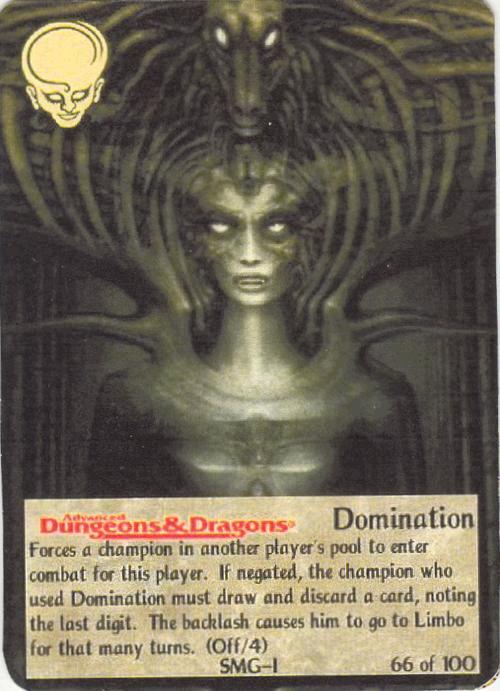Domination
(Devotion)

-
Domination
(Devotion)

-
|
|
|
|
|
|
|
|
|
|
|
|
Effect: By xercise
of the discipline of domination,
the psionic forces the mind
of another creature to accept signals from his or her own brain,
thus causing the former
to do his or her will.
Contacting the mind to be
dominated costs 5 strength points, and the creature must then save
vs. Magic. <Spell>
If the save is not made,
the psionic must then expend additional points equal to the dominated creature's
Ievel/HD
(treat + 1 to + 4 on the
creature's hit dice as 1 additional hit die, + 5 or more as 2 additional
hit dice,
with respect only to races
of creatures not classed as character races)
for each round the creature
is controlled.
Furthermore, if the creature
dominated is forced to do something totally against its nature or self-destructive,
the expenditure of strength
points is doubled or trebled accordingly.
Q:
If a fighter gains the discipline of domination
and then
switches to the thief class
(as a bard would do), would this character
lose the domination power?
A: Yes.
The instant that the character
crosses over to begin earning
experience as a thief,
he is subject to the benefits and restrictions
of that class -- one of
those restrictions being that a thief
cannot possess the psionic
discipline of domination. The discipline
is lost, and the character
may
not replace it with another
ability. This principle
may be applied to any instance involving
a two-classed
character and a discipline that is prohibited to one
of the two classes.
Why can't
thieves use domination in the first place? Well, as
Arthur Collins points out
in an article elsewhere in this magazine,
it may be rationalized that
domination is a concept alien to
the thieving frame of mind;
thieves do not desire or intend to
control their victims, merely
to rob them, taking their goods
unseen (preferably) and
without the victim's knowledge. Stealing
is an art to thieves, and
domination is the antithesis of that art.
(78.18)